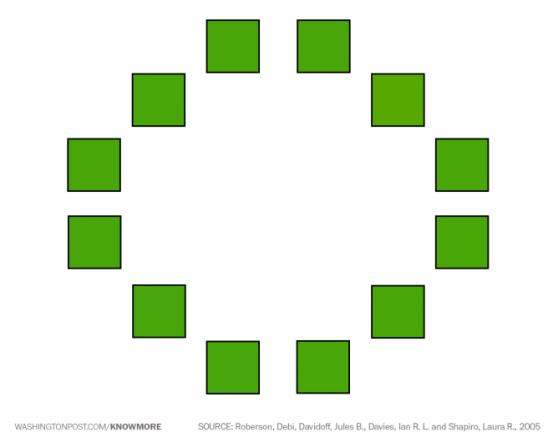Look at the color wheel below. Can you quickly identify the blue square?

Before you pat yourself on the back with glorious ideas of keen color perception… it’s pretty likely that you can. (Unless you’re color blind and didn’t realize it, in which case… #moment?)
But here’s the thing: in scientific studies, cultures which don’t have a word for the color blue – like the Himba tribe in Namibia – take much longer to identify the blue square in a similar situation. The Himbas don’t have words to distinguish between blue and green, and instead just see… a lot of green. More green, in fact. On the other hand, when Himbas look at a color wheel like the one below, they can more easily select the outlier.

Now who’s got the superpowers?
Similarly, a 2007 study found that Russians who have words for light blue and dark blue, but no word for just blue, can more quickly identify various shades of blue than English speakers.
Some people have taken this to the extreme, and suggested it means we couldn’t even see the color blue until the Egyptians constructed a word for it in 2500 BC. Indeed, the word “blue” is completely absence from ancient texts. For example, in Homer’s Odyssey, the ocean is “wine-dark.” And if you think about it, there really aren’t many natural blue things in nature. There’s the sky, the ocean (maybe?), and… blueberries? But even those are sort of purple?
THE POWER OF LANGUAGE
It’s possible we can only conceive of colors and even concepts in general, when we attach language to it. It’s like that feeling when you just can’t put your finger on it. In such a situation, you have an inner instinct, but you can’t identify it. Perhaps identification via language is what renders something understandable to us.
I am reminded of the Greek’s four different words for love: agape (typically unconditional love between God and man), eros (sexual love), philía (friendship love), and storgē (typically love between parents and children). Does having these different words for love, create different forms of love? Could you love at all, if you had no word for it?
In any case, you can hack language to supercharge your life. In The Code of the Extraordinary Mind: 10 Unconventional Laws to Redefine Your Life and Succeed On Your Own Terms, Vishen Lakhiani invents his own terms to identify life concepts, and provide self-motivation and productivity. (For example, “brules” are “bullsh*t rules which unnecessarily hold us back.)
I encourage you to take this knowledge and run with it. Identify something in the world – be it a feeling, concept, or hue – which you have no words for… and name it. It just may color your world in more ways than one.

